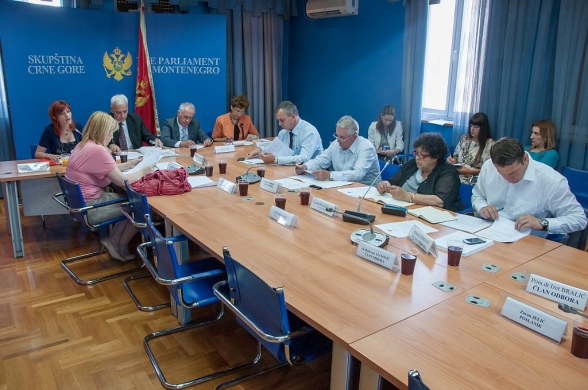Ms Vesna Simović PhD, Acting Deputy Minister of Labour and Social Welfare of Montenegro submitted introductory explanation on the Proposal for the Law on Strike, stating that it defined novelties relating to conditions and manner of the organisation of strike, exclusion from the work of employees not participating in the strike and rights, obligations and responsibilities of employees and employers regarding strike.
She emphasised the following most significant novelties on strike: narrowing the list of activities for which is necessary to determine the minimal work process; obligation of parties in dispute to cooperate for the purpose of providing the minimal work process in line with law and general interest; parties in dispute from the day of announcing strike and during the strike in social dialogue to try amicably to resolve dispute or to initiate procedure for peaceful resolving of dispute in line with special law; minimum work process to be determined with respect of tripartite social dialogue; responsibility of organisers for organising illegal strike as well as protection of employed in the case of illegal strike.
Employees performing work of general and public interest, according to proposed decisions, may initiate the strike if the minimum work process is previously established, ensuring security of people and assets or is irreplaceable condition of life and work of citizens, i.e. protecting national security and functioning of authorities.
The novelty is that in activities that minimum work process must be established for, the act of that minimum shall be established by the competent administration authority, representative organisation of employer and representative organisation of trade union, not later than 90 from the day of coming into effect. The role of the Agency for Amicable Settlement of Labour Disputes is important if subjects concerned cannot reach agreement on the issuance of act on a minimum work process. In that case, the competent body shall be obliged to inform, with no delay, the Agency on it, which will form in certain period Arbitration panel to determine the minimum work process, thus the decision on minimum work process is obligatory for parties in dispute.
Ms Vesna Simović PhD stated that it was proposed new institute to be established – exclusion from the work process (lock out), as a contra measure for employees not participating in the strike, if the strike had been already initiated and if at 30 days passed from its beginning, in order to prevent bad consequences in the production process due to long duration of strike. The number of employees excluded from work in such situation may not exceed one third of employees participating in the strike, thus the exclusion from the work can last, at longest, up to cessation of the strike. In case of lock out, the employees have no right to earnings, and employer is obliged to pay contributions to social insurance as if they were at work, in accordance with the regulations on social insurance. However, exclusion from work, according to proposed decisions, shall not be possible to organise for activities of general and public interest, due to the fact that those ensure security of people and assets or are irreplaceable condition of life and work of citizens, i.e. protecting national security and functioning of authorities.
Bearing in mind that legal strike is organised collective action, manifested by peaceful gathering of employees at the workplace or in the employer's business premises, a strike can be also manifested by non-appearance of employees at work. With regard to that, the strike board and employees participating at the strike must not prevent an employer to dispose with assets used for performing the activity, as well as that the strike board and the employees participating in the strike cannot prevent employees who do not participate in the strike to work.
Members of the Committee on Human Rights and Freedoms posed questions and asked for explanations regarding certain decisions from the Proposal for the Law on Strike, and the Deputy Minister of Labour and Social Welfare additionally explained it.
Ms Ivana Mihailović, representative of the Union of Free Trade Unions, also participated in the discussion, stating views of the Union regarding proposed decisions, pointing out that there were certain differences between text harmonised at the Meeting of the Social Council and text of the Proposal for the Law on Strike submitted to the Parliament.
After the discussion, the Committee supported with majority of votes cast (five “for” and two “against”) the Proposal for Law on Strike and proposed it to the Parliament for adoption.
Within current issues, the Committee got acquainted with Letter of the Agency for Personal Data Protection and Free Access to Information, which contains actual decisions aimed at specifying Request considered at the Eleventh meeting of the Committee, held on 24 May 2013, and by which the Agency requires the support of the Committee in endeavouring financial conditions for adequate application of the Law on Free Access to Information and points out to insufficient staff of the Agency. The Committee decided the Letter of the Agency to send to competent Ministry of Finance of the Government of Montenegro and to indicate them to consider requirements of the Agency, especially bearing in mind that the competence of the Agency is expanded due to obligations defined by the Law on Free Access to Information.
In addition, the Committee got acquainted with the Letter of the NGO “CEDEM” regarding organising of public discussion dedicated to new possibilities and challenges of social inclusion of Roma community in Montenegro within accession process to the European Union. It was assessed that the Initiative was acceptable, but on the occasion of determining the date of public discussion, the Calendar of the following activities of the Parliament of Montenegro should be taken into account.









